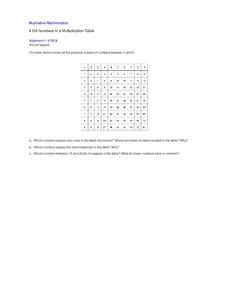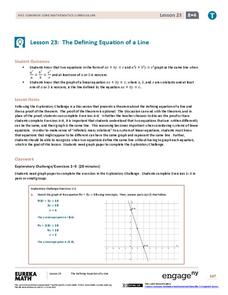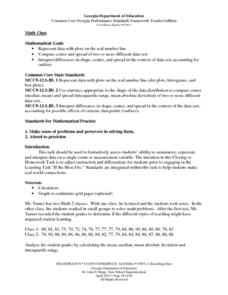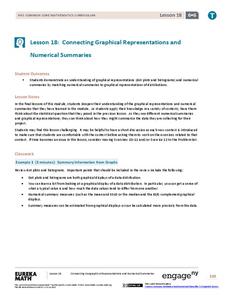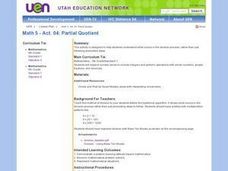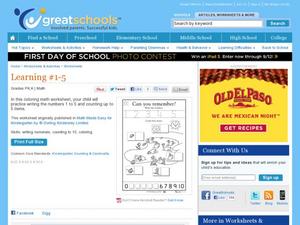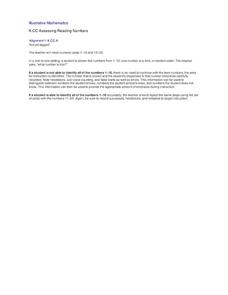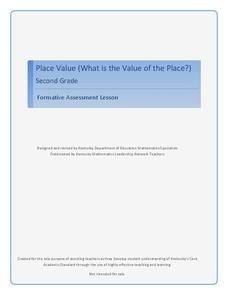August House
The Stolen Smell
Some smells are better than others! Explore your sense of smell with a series of activities based on the Peruvian folktale, The Stolen Smell. With exercises about phonics, counting, cooking, art, and drama, the lesson is a...
Education Development Center
Making Sense of Unusual Results
Collaboration is the key for this equation-solving lesson. Learners solve a multi-step linear equation that requires using the distributive property. Within collaborative groups, scholars discuss multiple methods and troubleshoot mistakes.
Curated OER
Integrating Gandhian Principles of Communal Unity in Mathematics
Fourth through sixth graders incorporate Gandhian principles into Math curriculum. They explore Gandhi's teachings on communal unity and economic equality. This has quite a bit of information about Gandhi and his observations and...
Illustrative Mathematics
Numbers in a Multiplication Table
Identifying patterns is a crucial skill for all mathematicians, young and old. Explore the multiplication table with your class, using patterns and symmetry to teach about square numbers, prime numbers, and the commutative and identity...
EngageNY
The Defining Equation of a Line
They appear to be different, yet they are the same line. Part 24 out of 33 lessons provides a theorem about the relationships of coefficients of equivalent linear equations. Pupils use the theorem to determine whether two equations are...
Noyce Foundation
Perfect Pair
What makes number pairs perfect? The resource provides five problems regarding perfect pairs of numbers, the definition of which changes in complexity with each task. Solutions require pupils to apply number sense and operations, as well...
Curated OER
Horizontal Three Digit Place Value Addition 2
What number do you get when you add 700, 20, and 9 together? You get 729, which just happens to be standard form. Build stong number sense with 16 problems where expanded form is converted to standard form.
Georgia Department of Education
Math Class
Young analysts use real (provided) data from a class's test scores to practice using statistical tools. Not only do learners calculate measures of center and spread (including mean, median, deviation, and IQ range), but...
EngageNY
Connecting Graphical Representations and Numerical Summaries
Which graph belongs to which summary statistics? Class members build upon their knowledge of data displays and numerical summaries to connect the two. Pupils make connections between different graphical displays of the same data in...
Curated OER
Tens and Ones Fun
Youngsters use their large motor skills to build numbers to 20 in this outdoor, kinesthetic, collaborative activity. Amass cardboard boxes for groups to stack, sort, and bundle into 10s and 1s to show numbers and place value. They'll...
Curated OER
Fractions, Decimals, and Percentages Got You Down? "Tri" This!
Students explore number sense by creating a math presentation in class. In this parts of a whole lesson, students define and discuss the relationship between fractions, decimals and percentages before completing a problem worksheet in...
Virginia Department of Education
Scientific Notation
Writing a number is all in the notation. The resource introduces the class to scientific notation. Pupils learn the process of taking a very large or small number in standard form and write it in scientific notation. To practice,...
Virginia Department of Education
Absolute Value
Your birthday can be more than just about presents; it can even teach about absolute value. The class investigates absolute value as the distance from zero on a number line. Plotting birth months and comparing each birth month to July...
Illustrative Mathematics
Sort and Count II
Capture the engagement of young mathematicians with this hands-on sorting activity. Given a bag of objects, learners work independently sorting the items based on their physical attributes, counting to determine the size of each group....
Curated OER
Partial Quotient
Students study what occurs in the division process, rather than just following prescribed steps. They expand number sense to include integers and perform operations with whole numbers, simple fractions, and decimals. They write a word...
DK Publishing
Can You Remember? Learning #1-5
Start from the beginning with new counters! They practice number concepts, tracing five digits: 1, 2, 3, 4, and 5. Next, scholars count the number of each object in an illustrated pond scene. How many suns? How many ducks? There are five...
DK Publishing
Learning 6 - Write the Word
Which plate has six cookies? Focus on the number six with novice counters as they solidify single-digit number concepts. Keep in mind pre-readers may have trouble with this, as there are written instructions they will need to...
Illustrative Mathematics
Making a Clock
Have a fun time teaching children to read analog clocks with this whole-group math activity. Using large sets of the numerals 1-12 and 0, 5, 10...55, the teacher creates a large clock on either the carpet or the white board, explaining...
Curated OER
Mixed Fraction Quiz
Quiz the class on their ability to correctly identify both mixed numbers and fractions. As this collection of slides progresses learners either shout out or raise their hands to correctly identify the mixed number or fraction shown. Each...
DK Publishing
Learning 11 and 12 - Write the Numbers
Make number concepts fun with this party-themed set of activities aimed at familiarizing young counters with 11 and 12. They begin by tracing each numeral before printing it once on their own. Next, learners count a set of...
Illustrative Mathematics
Assessing Reading Numbers
Youngsters develop their number sense by rote counting from one to ten. Over time, they identify the numbers on their own and no longer rely on fixed recitation. Using numerical flashcards, a teacher will randomly choose numbers from the...
Curated OER
Place Value - What Is the Value of the Place?
Second graders build number sense in an activity that requires the matching of base 10 representations to numbers. It is the teachers responsibility to gauge student understanding and involvement while class members work in groups.
Balanced Assessment
Smaller, Larger, In-Between
Build a solid understanding of rational number relationships by asking class members to use various skills to order decimals, fractions, and numeric power expressions. Using the resource, they find that the fractions do not have an...
Curated OER
Applied Science - Science and Math Lab
Students explore the senses. In this Applied Science lesson, students investigate the items in "feely" boxes with their hands, both touching the items and shaking the boxes to hear the sound the items make. Students also smell and taste...



